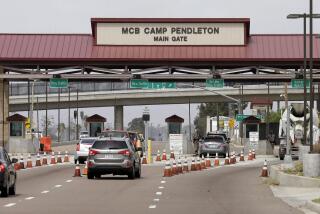Prosecutors Seek Harsh Penalty in Okinawa Rape
- Share via
TOKYO — In final hearings Monday, prosecutors demanded a harsh sentence for the three U.S. servicemen accused of raping a 12-year-old Japanese girl. They asked for 10 years’ imprisonment with hard labor--equivalent to the harshest sentence ever handed down for this type of crime by a Japanese court.
Last fall’s rape of the schoolgirl in Okinawa sparked a national uproar here. The girl was abducted on the way home from a store on the evening of Sept. 4, bound with tape, punched repeatedly, raped on a deserted beach and then dumped on a little-traveled road. She was hospitalized for two weeks due to injuries, according to medical evidence.
The case led to the most massive demonstration in more than 30 years against the U.S. military presence in the southern island region, where two-thirds of facilities for the 47,000 U.S. military personnel in Japan are located.
There have been calls throughout Japan for the U.S. military to go home, and the case has provoked discussions on both sides of the Pacific about the role of the United States in Asia in the post-Cold War era.
In their closing arguments, prosecutors used vivid and powerful language to portray the rape as premeditated and exceptionally vicious. It was an act so horrible, they said, that it “shattered [the victim] even more than death.”
The prosecution also read a plea from the girl’s father that the three servicemen be punished as severely as legally possible.
“Please keep these criminals in prison until they die,” the father wrote.
Navy Seaman Marcus Gill, 22, of Woodville, Texas, confessed to both the rape and the abduction. But Marine Pfc. Rodrico Harp, 21, of Griffin, Ga., and Marine Pfc. Kendrick Ledet, 20, of Waycross, Ga., deny raping the girl. They asserted in earlier court testimony that Gill coerced them into taking part in the crime.
All three are charged in Naha District Court with rape causing injury. Chief prosecutor Masayuki Nomura said the criminal responsibility of all three was “equally great.”
His words will not be taken lightly. In the Japanese legal system, where panels of judges rather than juries hand down verdicts, criminals brought to court face a 99% conviction rate.
Sentencing is scheduled for March 7.
After coaching from their lawyers, who advised that a remorseful attitude can lighten sentences, all three servicemen, plus family members who flew in for the trial, apologized in court to the victim and her family. They also all agreed to pay financial compensation.
But Yutaka Arakawa, Ledet’s defense lawyer, said the girl’s father declined the second installment of the $15,000 payment when he heard the defendants would cite the payments when pleading for a more lenient sentence.
Before handing over the U.S. servicemen to the Japanese, the military argued that military personnel usually get stiffer sentences in U.S. military courts than in Japanese courts. However, under an agreement with the Japanese government, the U.S. was compelled to turn the men over after charges were filed.
The three men face a minimum of three years’ and a maximum of life imprisonment. Had they been tried and convicted in a U.S. military court, they would have received a minimum of five years or, more likely, a sentence of about 25 years, one military official said. Convicted rapists are subject to life imprisonment or even the death penalty in U.S. military courts, although those sentences are rarely applied.
The rape caused an explosive reaction against the U.S. military partly because latent tensions already existed between the troops and the surrounding communities--tensions amplified as people began to question the status quo in the post-Cold War era, said Mike Mochizuki, a Brookings Institution scholar specializing in Japanese political and security issues. He also said the Japanese government has not done enough to explain to the public why Japan needs the U.S. troops.
Brought to the fore, and still unresolved, the troops issue is expected to dominate President Clinton’s visit to Japan scheduled for April.
Meanwhile, a U.S. Marine was sentenced Monday to 11 years in prison for the bludgeoning death of an Okinawan woman. Pfc. Joshua Hill of Youngstown, Ohio, had claimed he was mentally unstable, but the brutality of the crime outraged Okinawans and set the stage for the anger that erupted after the rape.
More to Read
Sign up for Essential California
The most important California stories and recommendations in your inbox every morning.
You may occasionally receive promotional content from the Los Angeles Times.













